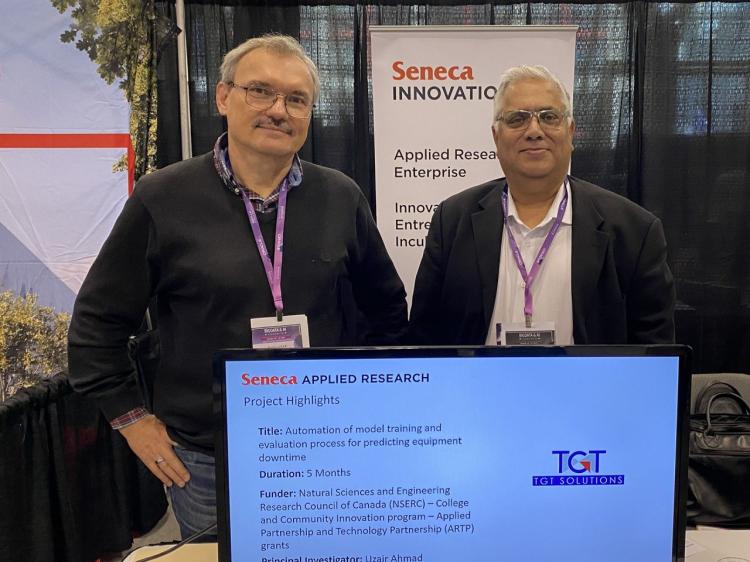Manufacturers can lose a lot of money when machines unexpectedly break down, grinding production to a halt.

Ralph Lisak, Research Manager, Applied Research (left) and Henry Stevens, Senior Consultant, TGT, worked together on the project to build a predictive tool for manufacturing. (Submitted by Ralph Lisak)
And the unexpected problems are exactly what TGT Solutions, a tech company based in Stratford, about 150 kilometres west of Toronto, wants to help manufacturers avoid.
To do so, TGT recently teamed up with Seneca Applied Research to build a tool to predict what machines will do, so companies will be able to see potential problems before they arise and keep systems running optimally.
"We know there is a market for this kind of tool," said Henry Stevens, Senior Consultant, TGT.
About 68 per cent of industrial businesses experience unplanned outages at least once a month, according to a survey by ABB, a Zurich-based engineering company. The downtime costs a typical manufacturer about $242,000 an hour. The study, cited in Canadian Manufacturing magazine, consulted 3,215 plant decision-makers across a range of industries globally in July 2023 and was carried out by Sapio Research.
Thanks to advances in cloud computing, easy access to significant amounts of computing power and the availability of large datasets, the time is right to develop solutions to issues like this, said Ralph Lisak, Research Manager, Applied Research.
"These days, machines have built-in computers and there's a large amount of data being generated everyday, so there's a huge opportunity to build tools that will leverage that data," said Dr. Lisak, who oversaw the TGT project.
In order to build a prototype, the research team had to develop a model to analyze vast amounts of data typically generated on production floors and then use that to forecast what the machines would do in a future timeframe of five-minute intervals.
The team worked with TGT's partner Memex, a software solutions company based in Burlington, about 70 kilometres southwest of Toronto, and Braintoy, a machine-learning company based in Calgary. Memex provided a dataset of about four million examples from 34 machines. And Braintoy supported the research with a low code/no code AI platform called mlOS.
"We built a predictive model for this research and it went very well," Dr. Lisak said.

Nithya Kalyani Parameswaran, Research Assistant, enjoyed working on the project and gaining industry experience. (Submitted by Nithya Kalyani Parameswaran)
Uzair Ahmad, Professor, School of Software Design & Data Science, and research assistants Nithya Kalyani Parameswaran, a graduate of the one-year Business Analytics graduate certificate program and Rahul Bajaj, a student in the three-year Computer Programming & Analysis advanced diploma program, rounded out the team.
Ms. Parameswaran, who is now an Operations Representative with Fidelity Canada, said it was a great way to apply some of the data cleaning, coding and statistical skills she learned in the classroom.
"I had very good industry exposure - starting from the beginning to the delivery of the product," she said.
Mr. Stevens was impressed with the team and the results. Working with Seneca enabled TGT to fast-track the development process, he said, noting the tool will soon be piloted by three manufacturers in the United States.
Ultimately, it could be tailored to different types of machines to help companies optimize workflow, reduce disruptions and enhance their competitive edge.
"We want to do a lot more with Seneca," Mr. Stevens said. "We want to build more products that will improve profitability and give end-users a competitive edge."













